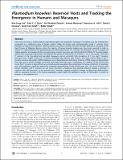Plasmodium knowlesi : reservoir hosts and tracking the emergence in humans and macaques
Abstract
Plasmodium knowlesi, a malaria parasite originally thought to be restricted to macaques in Southeast Asia, has recently been recognized as a significant cause of human malaria. Unlike the benign and morphologically similar P. malariae, these parasites can lead to fatal infections. Malaria parasites, including P. knowlesi, have not yet been detected in macaques of the Kapit Division of Malaysian Borneo, where the majority of human knowlesi malaria cases have been reported. In order to extend our understanding of the epidemiology and evolutionary history of P. knowlesi, we examined 108 wild macaques for malaria parasites and sequenced the circumsporozoite protein (csp) gene and mitochondrial (mt) DNA of P. knowlesi isolates derived from macaques and humans. We detected five species of Plasmodium (P. knowlesi, P. inui, P. cynomolgi, P. fieldi and P. coatneyi) in the long-tailed and pig-tailed macaques, and an extremely high prevalence of P. inui and P. knowlesi. Macaques had a higher number of P. knowlesi genotypes per infection than humans, and some diverse alleles of the P. knowlesi csp gene and certain mtDNA haplotypes were shared between both hosts. Analyses of DNA sequence data indicate that there are no mtDNA lineages associated exclusively with either host. Furthermore, our analyses of the mtDNA data reveal that P. knowlesi is derived from an ancestral parasite population that existed prior to human settlement in Southeast Asia, and underwent significant population expansion approximately 30,000-40,000 years ago. Our results indicate that human infections with P. knowlesi are not newly emergent in Southeast Asia and that knowlesi malaria is primarily a zoonosis with wild macaques as the reservoir hosts. However, ongoing ecological changes resulting from deforestation, with an associated increase in the human population, could enable this pathogenic species of Plasmodium to switch to humans as the preferred host.
Citation
Lee , K-S , Divis , P C S , Zakaria , S K , Matusop , A , Julin , R A , Conway , D J , Cox Singh , J & Singh , B 2011 , ' Plasmodium knowlesi : reservoir hosts and tracking the emergence in humans and macaques ' , PLoS Pathogens , vol. 7 , no. 4 , e1002015 . https://doi.org/10.1371/journal.ppat.1002015
Publication
PLoS Pathogens
Status
Peer reviewed
ISSN
1553-7366Type
Journal article
Collections
Items in the St Andrews Research Repository are protected by copyright, with all rights reserved, unless otherwise indicated.

